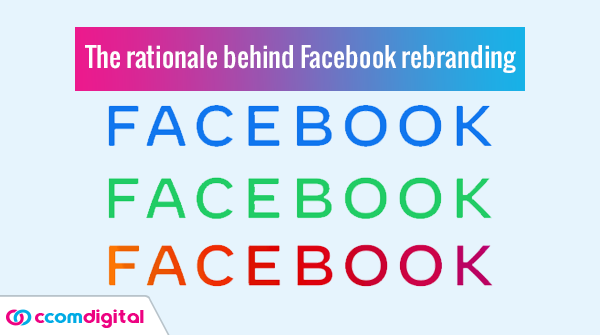The Facebook company, whose services include the Facebook app, Messenger, Instagram, WhatsApp, Oculus, Workplace, Portal and Calibra, recently underwent a rebranding exercise to become more closely associated with their suite of apps and make users more aware of where the products they use come from.
In June this year, Facebook added the not so subtle ‘from Facebook’ to all their products. Earlier in April, it was reverse engineer Jane Manchun Wong, who discovered the early signs of rebranding in the Instagram app. Instagram’s popularity then was at an all-time high, while Facebook was facing flak over the data breach and Cambridge Analytica scandal. Hence, it made sense for the company to want to be more closely associated with its sister app.
In 2018, the Infinite Dial Report showed that Facebook usage had gone down for the first time ever and the US distrust, discord and disinterest were played up as the key factors for Facebook’s decline.
In fact, Facebook has faced a series of litigations and bad press ever since US President Donald Trump took office followed by Cambridge Analytica, the data breach on Messenger, and when a San Francisco court fined the company $40 million for inflating views on video ads.
So, Facebook has been piggybacking on its more popular apps like Instagram to divert some of the goodwill from the users or to attract advertisers. That resulted in Mark Zuckerberg claiming that Instagram’s growth was the result of them successfully leveraging Facebook’s growth tools in July 2018. While this may be true, soon both Instagram founders collectively quit in September 2018 due to ‘differences’ with Zuckerberg.
What does this have to do with the Facebook rebranding?
For one, Instagram has crossed 1 billion subscribers and is by far the most popular app in the Facebook suite. With an average user age of 30 years (a decade younger than Facebook’s average of 40 years), Instagram is Facebook’s cash cow of the future. In the shadow of Instagram’s popularity, the big challenge for the creators of the Facebook app is to remain relevant to advertisers as it comes to be seen increasingly as an unsafe space for brands.
Shiraz Khan, Founder, Spicetree Design Agency (SDA), noted, “Facebook had to make some strategic moves to protect its other products from all the backlash it is facing of late. By creating a parent logo for all its suite of products, it is ensuring the safety of its properties and to show Facebook in good light. It also wants to clearly show the structure of the company in terms of ownership. With this move, it also safeguards its interest from a complete fallout of the brand.”
Saurabh Pacheriwal, Co-founder, Gemius Creative Design Studio, added here, “Research shows that over 50 percent of the users of Facebook group apps such as Instagram and WhatsApp do not know that the platforms are owned by Facebook. This new identity will be connecting the company seamlessly with the other products and in effect, try to regain the lost brand image.”
Chandan Bagwe, Founder & MD, C Com Digital, felt that this rebranding is good in a way because it is aimed at presenting Facebook as a big entity with multiple product lines with individual user bases. Thus, it would help to attract more funds through the cross working of app platforms and accumulating the ads generated.
“While Google has a suite of 60 apps and is a prominent entity in the digital sphere, Facebook is relatively small with a fewer number of apps under it. Facebook, too, wants to show that it is also an important entity with multiple apps under its name, each having a good user base,” he added.
Is ‘from Facebook’ going to be the only change?
The new Facebook company logo incorporates themes from its group of apps so that it integrates well. The font style is minimal and not a huge departure from the previous brand. Before the formal rebranding came into effect, Facebook had already introduced a slew of policy changes, such as bringing more transparency in political advertising and giving users more control over the ads they view and their data, with the hopes of improving public perception.
However, it remains to be seen whether through this rebranding Facebook will it be able to isolate the backlash to its specific apps and not further tarnish the reputation of the umbrella brand. On the other hand, the group of apps may also be isolated from Zuckerberg, whose statements and actions will hopefully reflect only on the parent brand.

